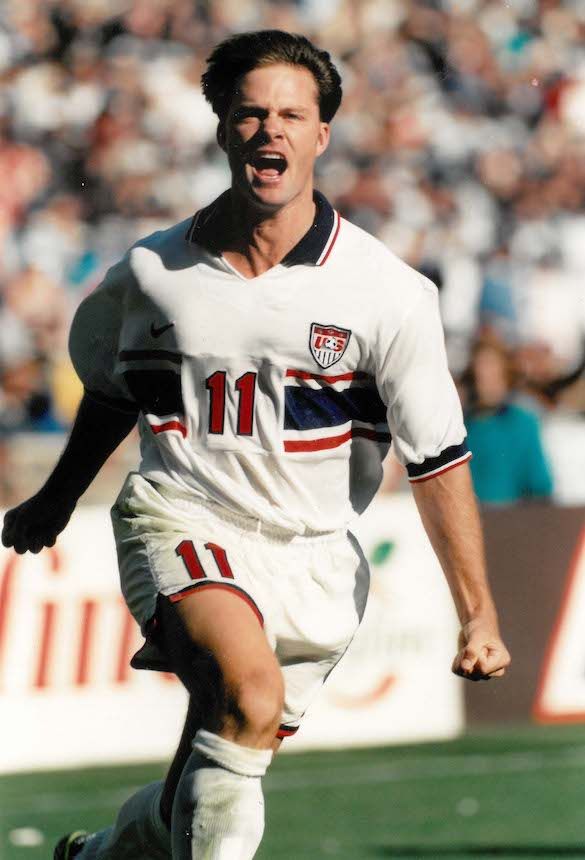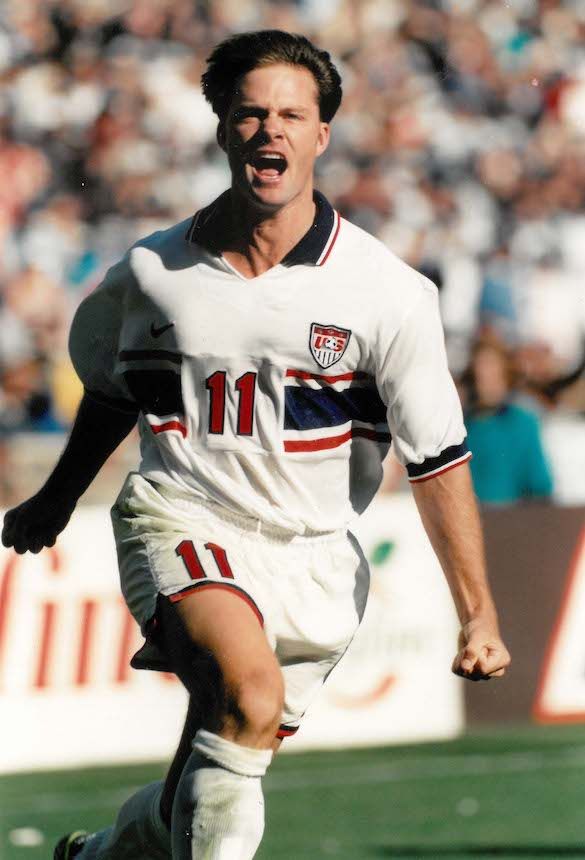WCQ Series History: Costa Rica Away
Detailing the USMNT’s Qualifying visits to Costa Rica in 1985, 1997 and 2000



Regardless of where it has played in Costa Rica, the U.S. Men's National Team has struggled trying to accrue points.
In 10 FIFA World Cup Qualifiers, the USA has recorded one point while compiling a 0-9-1 mark.
While the USMNT could qualify for the 2022 FIFA World Cup even with a loss, the team will try to turn things around when they meet the Ticos at Estadio Nacional in San Jose on Wednesday, March 30 at 9:05 p.m. ET. (CBS Sports Network, Paramount+, Universo, Peacock).
Here are three memorable WCQ matches in Costa Rica:
The USA played all four of its Concacaf semifinal round matches for the 1986 World Cup in Mexico during a 17-day span.
The USMNT started with two victories over Trinidad & Tobago. Chico Borja and Mark Peterson scored in a 2-1 win in St. Louis on May 15. Paul Caligiuri tallied in a 1-0 triumph in Torrance, Calif. four days later.
The Costa Ricans weren’t as efficient. In two home matches against T&T, they earned a 3-0 win, but registered a 1-1 draw several days later.
With a key home-and-home series vs. the U.S. looming, the Ticos made drastic changes. They fired their coach and added a unique WCQ twist. They essentially brought in an entire club team – Alajuelense - as the national team and hired Alvaro Grant as coach. Instead of playing the USMNT at Estadio Nacional in San Jose, the contest was moved to Alajuelense's home stadium, at Estadio Alejandro Morera in Alajuela.
"We had beaten Costa Rica, 3-0, in the 1984 Olympics and this was a revenge game," former U.S. international Erhardt Kapp said several years ago.
U.S. head coach Alkis Panagoulias deployed a young Starting XI that included five college players and several others who recently completed their Major Indoor Soccer League seasons as they transitioned from the indoor to outdoor game.
As the U.S. national anthem was played, several Costa Ricans ran onto the field carrying a banner that read, "Throw the military Yankees out of Costa Rica,” referring to the presence of 20 military advisers sent to train the Costa Rican civil guards.
"About 25 MPs totally manhandled the protesters to the ground, dragging them off the field to the spectators’ cheers," Kapp said.
The hosts grabbed the lead in the 42nd minute when goalkeeper Arnie Mausser fumbled a low cross. Oscar Ramirez slotted home the rebound.
Only two minutes later, the Americans silenced the enthusiastic crowd as two players still in college combined for the equalizer.
Mike Windischmann, future USMNT captain at the 1990 FIFA World Cup, sent a long pass into the penalty area that Jeff Hooker (UCLA) ran down on the left side. He crossed the ball to John Kerr, Jr. (Duke University), who volleyed it home.
The USA managed to hold off the Ticos, who kept coming in waves. They outshot the visitors, 13-3, and attempted more corner kicks, 16-2.
Buoyed by the fine defensive play of center backs Dan Canter and Caligiuri (UCLA), the U.S. bent but never broke. Costa Rica came close in the final minute, as Franklin Williams' header sailed six inches wide of the post.
"All we wanted to do was come away with a tie," Kapp said. "We were so happy after the game because we knew how difficult it was to play in Alajuela. The fans are right on top of you and 20,000 fans cheering for the home team makes it extremely hard to play your game.
"We just wanted to get out of there as quickly as possible because the home crowd was not happy," he continued. "Luckily we had a police escort back to our hotel. We were so proud of our accomplishment!
"It's never a lot of fun playing in that type of atmosphere, but a World Cup berth was riding on these two games. I definitely thought we were finally going to make it."
Nearly 36 years later, this remains the only time the U.S. has gotten a result on Costa Rican soil.
After the gutsy performance, the USMNT needed only a draw to reach the final round. But they fell short, losing to the Ticos in Torrance, Calif., 1-0, on May 31, exactly a year to the day of the start of the 1986 World Cup.
Due to the luck of the draw, this was the USA’s second WCQ in the Central American country in almost four months. The USMNT suffered a 2-1 defeat in the semifinal round on Dec. 1 at Estadio Saprissa in San Jose that was better remembered for fans pelting the team with garbage, coins and batteries.
Facing stiff sanctions by FIFA, the Costa Rican supporters cleaned up their act as a capacity crowd of 20,000 was on its best behavior for this encounter.
The USMNT came close to securing a precious point, twice overcoming deficits. It also was the first and only time the Americans scored two goals in Costa Rica.
"When they give you a point, you should not give it back," then U.S. general secretary Hank Steinbrecher said.
Head coach Steve Sampson, whose team fell to 1-1-1 in the Concacaf Octagonal, agreed. "We had that one point in our hands ... we lost it,'" he said. "We tried to hang on and cover the spaces on defense, but their speed was too much."
Hernan Medford opened the scoring in the 10th minute after Harold Wallace intercepted a poor pass by Thomas Dooley. The goal snapped a five-match shutout streak by goalkeeper Kasey Keller, who conceded for the first time in 562 minutes.
Eric Wynalda knotted things up in the 24th, connecting from 15 yards for his 30th international goal.
Mauricio Solis countered for the Ticos, dribbling down the middle of the field and beating Keller from 35 yards for a 2-1 advantage in the 32nd minute.
Striker Roy Lassiter, a second-half sub who previously played professionally in Costa Rica, equalized in the 68th minute for a 2-2 tie after intercepting a pass from Solis that was intended for Ronald Gomez.
Gomez, however, had the final word in the 76th minute. Harold Wallace picked up a loose ball outside the penalty area, faked Alexi Lalas and chipped a cross that defender Mike Burns kicked onto the foot of Gomez at the near post.
"We shouldn't have allowed those gaps in the back, we should have been tighter," Burns said. "With 15 minutes left, that should never have happened."
Just like in 1997, the USMNT felt they made a pretty good case to walk out of Saprissa with a point during this semifinal round clash.
Instead, they exited the venue furious, claiming they were robbed on a phantom handball call by Jamaican referee Peter Prendergast. With the score tied at 1-1, he brazenly made the pivotal call two minutes into stoppage time on defender Gregg Berhalter, now USMNT head coach.
Instead of securing a draw, the USA had nothing but anger and frustration to show for its efforts.
Rolando Fonseca's eight-yard header gave the Ticos a 10th-minute lead, but Earnie Stewart, the current U.S. Soccer sporting director, tied it, slotting home a rebound on an Ante Razov shot in the 65th minute, setting up the controversial finish.
Hernan Medford sent a cross into the area that Berhalter headed down and out of bounds for an apparent corner kick. Prendergast, however, ruled the ball hit Berhalter's arm.
"It was the craziest thing. It really was," Berhalter told the U.S. Soccer Podcast in April 2020. "We felt really comfortable in the game. It was one of those things where we never have gotten a result in San Jose. It was injury time. The game was over.
"It's actually funny because it hit me like on the side of the head. It was hurting. I was rubbing my head. I turned around and Pendergast pointed for a penalty kick. You couldn't believe that would be called a penalty kick."
Medford converted the gift chance to the left of goalkeeper Kasey Keller. Thirty seconds later the game was called.
Afterwards, an incensed head coach Bruce Arena, captain Claudio Reyna and Stewart needed to be restrained by security guards and U.S. team officials from going after Prendergast in the center circle.
"It [the decision] was a disgrace," Arena said. "I saw it from the same angle as the ref and there was no way he could have seen it. I told him that he cheated us. The entire team is disgusted. This is not a way to decide a game."
Arena then stormed out of the press conference.
Reyna threw his captain's armband at Prendergast. "Concacaf referees are miles behind the rest of the world," he told the Washington Post. "I don't think the referee was awful the whole time, but that particular play was the game. It's terrible."